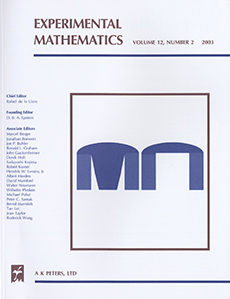Abstract
Rubinstein and Sarnak investigated systems of inequalities of the form $\pi(x;q,a_1)>\cdots>\pi(x;q,a_r)$, where $\pi(x;q,b)$ denotes the number of primes up to x that are congruent to b mod q. They showed, under standard hypotheses on the zeros of Dirichlet L-functions mod q, that the set of positive real numbers x for which these inequalities hold has positive (logarithmic) density $\delta_{q;a_1,\dots,a_r}>0$. They also discovered the surprising fact that a certain distribution associated with these densities is not symmetric under permutations of the residue classes $a_j$ in general, even if the $a_j$ are all squares or all nonsquares mod q (a condition necessary to avoid obvious biases of the type first observed by Chebyshev). This asymmetry suggests, contrary to prior expectations, that the densities $\delta_{q;a_1,\dots,a_r}$ themselves vary under permutations of the $a_j$.
Here we derive (under the hypotheses used by Rubinstein and Sarnak) a general formula for the densities $\delta_{q;a_1,\dots,a_r}$, and we use this formula to calculate many of these densities when $q\le12$ and $r\le4$. For the special moduli q=8 and q=12, and for $\{a_1,a_2,a_3\}$ a permutation of the nonsquares {3,5,7} mod 8 and {5,7,11} mod12, respectively, we rigorously bound the error in our calculations, thus verifying that these densities are indeed asymmetric under permutation of the $a_j$. We also determine several situations in which the densities $\delta_{q;a_1,\dots,a_r}$ remain unchanged under certain permutations of the $a_j$, and some situations in which they are provably different.
Citation
Andrey Feuerverger. Greg Martin. "Biases in the Shanks-Rényi prime number race." Experiment. Math. 9 (4) 535 - 570, October 2000.
Information




